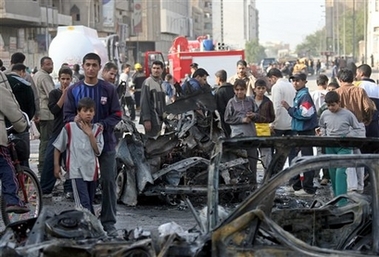Take the kidnapping of 50 or 100 or 150 (depending on who's counting) primarily Sunni men by Shiite gunmen at the higher education ministry in Baghdad.
Imaginative.Elements of the Mahdi Army, the Shiite milita run by anti-American cleric Moqtada al-Sadr, have been taking . . . well, fresh perspectives in pulling off such crimes. About 150 members of the academic elite have been killed since the war began and thousands have fled the country. The abductions prompted Abdel Salam Thiab, the Sunni head of the national university system, to threaten to shut it down. He later resigned.
Audacious.
Brazen.
Bold.
Yet the mass abductions, carried out in broad daylight, had a kind of business-as-usual feel to them that speaks volumes about the inability of the U.S., let alone Iraqis, to halt that country's accelerating slide into anarchy.
When as many as 50 gunmen wearing blue camouflage Interior Ministry commando uniforms pulled up in front of the higher education ministry on Nidhal Street in Baghdad's Karradah neighborhood in a convoy of about 30 Interior Ministry trucks and announced that they were on official business, who was going to stop them?
Certainly not the police, who stood by while the drama unfolded. You see, the cops in that district are led by a Shiite sympathizer, while the Interior Ministry itself has long been infiltrated by members of Shiite gangs and death squads.The gunmen went floor to floor in the ministry building and asked to see ID cards. Most Shiites were let go, while Sunni men (including some poor guy who was delivering tea) were herded out onto the street and into the trucks. Sunni women were told to give up their cell phones and the newer models were confiscated. They were then locked in a room, but were otherwise unharmed.
The kidnapping may have been in retribution for the abduction three days earlier of 50 Shiite passengers who were snatched off minibuses by Sunni gunmen at a fake checkpoint along the highway near Latifiyah, about 20 miles south of Baghdad. The gunmen killed 10 passengers before leaving with their captives.
The reaction to the mass kidnapping also had a business-as-usual feel:
A big manhunt but no apparent arrests any of the perpetrators.Later in the day, some of the abductees apparently were dropped off unharmed in Sadr City, the massive Baghdad slum run by Al-Sadr, and elsewhere in the easter part of the capital. There are conflicting reports about how many are still missing.
Several neighborhood police officials arrested.
Assurances from the central government that order will be restored.
An series of inane statements from Prime Minister Al-Maliki that the assailants were not really "terrorists," just wild and crazy members of the Mahdi Army, and that it was all "due to a dispute between militias."
Declarations of concern by U.S. and U.N. representatives.
Outrage by minority Sunni politicians and religious leaders.
Meanwhile, elsewhere in the Cradle of Civilization this week:
469 people have been killed in shootings or bomb attacks or found murdered.
They include 11 American troops, bringing the total for November to 45 and the toal for the war to 2,863, as well as four British troops, one Slovak troop, and one Iraqi woman journalist.
HOW'S THIS FOR A FRESH PERSPECTIVE?
The higher education ministry is just across the Tigris from the highly fortified Green Zone, where American troops are billeted, but it might as well be on a different planet.When a militia has the local constabularly, let alone a key security ministry, in its hip pocket and neighborhood snoops monitor the comings and goings of the American and Iraqi military patrols, it can pretty much operate with impunity.The massive U.S.-Iraqi security sweeps in Baghdad have been failures. The drama at the higher education ministry is just the latest catastrophe in a country that seems to have become numbed to them.
It is very late in the game. Any solution must be both military and political.
The only short-term way to stop the slide is to deploy another 30,000-50,000 U.S. troops and open talks with Iraq and Syria. Sending additional troops was politically unpalatable before the election and is certainly not going happen now. The White House has and continues to be adamantly opposed to talking to Teheran and Damascus.
So how about this for a fresh perspective?
Tell the Al-Maliki government, Al-Sadr and his Sunni counterparts (who have been no less bloodthirsty, only fewer in number), that if they don't get the national house in order ASAP the U.S. will begin pulling out its troops.Okay, so it's not gonna happen and if it did it probably would backfire. But at least I'm thinking.
That will result in a major freakout in three Middle Eastern capitals: In Baghdad, where even a rotten bastard like Al-Sadr cannot relish an all out civil war with the Sunnis, and in Teheran and Damascus, which have much to fear from the collapse of Iraq and the spread of sectarian violence, as well as the flood of refugees that would cross their borders.
More here, here and here.
(Photograph by Khalid Mohammed/The Associated Press)

No comments:
Post a Comment